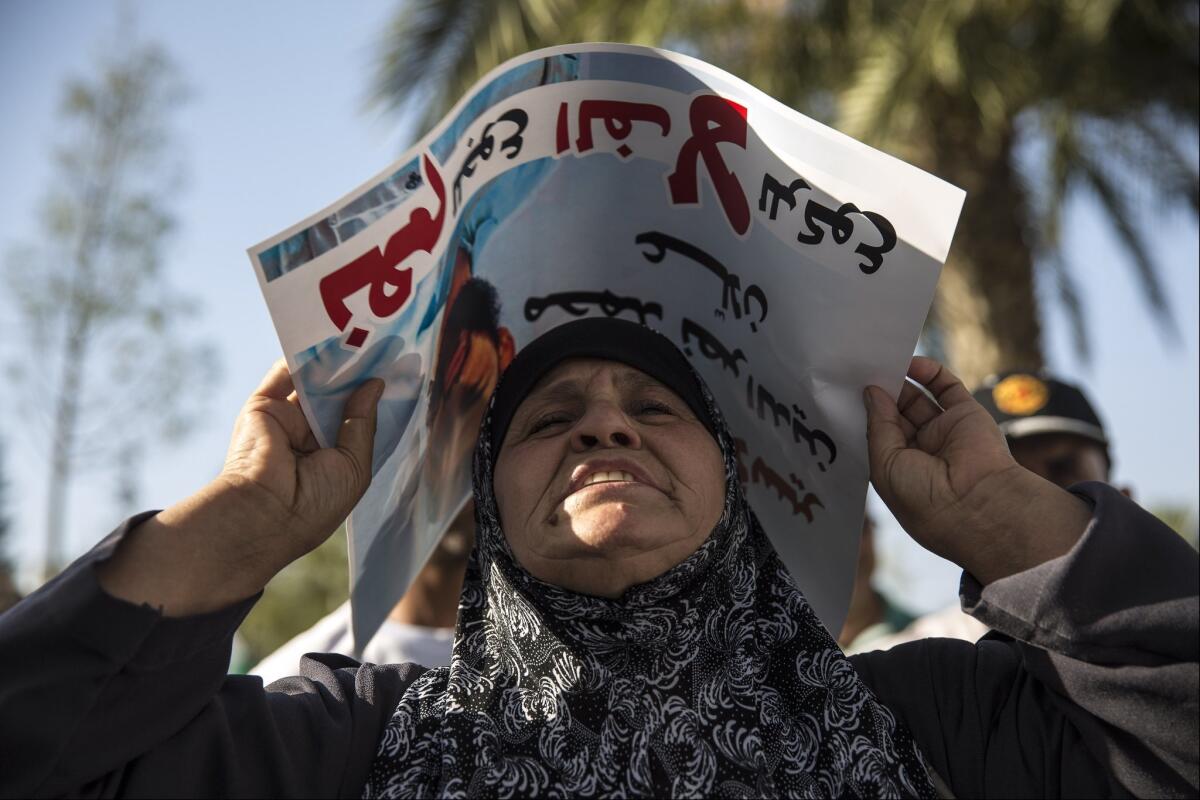Lawyers fear Israel may use new law to force-feed Palestinian hunger striker

Mazoza Allan, the mother of Palestinian hunger striker Mohammed Allan, takes part in a rally outside Soroka hospital in the southern Israeli city of Beersheba on Aug. 9.
- Share via
Reporting from Jerusalem — Lawyers for a Palestinian inmate who has been refusing food for more than 50 days are worried that Israeli authorities could make use of a controversial new law to begin force-feeding their client.
Mohammed Allan, a suspected member of the Palestinian militant group Islamic Jihad arrested in November, launched the hunger strike June 16 to protest his incarceration without charge under a legal mechanism known as administrative detention.
He was admitted last month to Soroka Medical Center in the southern Israeli city of Beersheba, but has been refusing treatment, including saline and vitamin supplements that doctors believe could prevent irreversible damage and save his life. He is accepting only water and is in a precarious medical condition, according to his attorneys at the Palestinian Prisoners Club.
Israel’s parliament approved a law last month that allows the prison service to seek permission from a judge to force-feed inmates, if their lives are in danger.
“We have a major concern that the IPS [Israel Prison Service] may use force-feeding against Allan at any time, and he might die in the process,” Qaddoura Faris, head of the Palestinian Prisoners Club, said Tuesday. “He might even die before they reach that stage because of his deteriorating health situation.”
One of Allan’s lawyers, Jamil Khatib, told reporters last week that the prison authorities had informed him that they would seek a court order allowing such measures to be taken. Finding a doctor who would agree to perform the highly controversial procedure could be a challenge, however.
The Israel Medical Assn. argues that force-feeding is dangerous and amounts to torture. It is challenging the new law in the supreme court.
But some doctors disagree, arguing that medical professionals have an obligation to do anything they can to save lives.
Members of the association and the hospital’s ethics committee met with Allan over the weekend and explained to him the benefits of accepting supplements, according to Israeli news reports. Allan was conscious at the time and rejected any such treatment, Dr. Tamar Karni, head of the association’s ethics committee, told Israel Radio on Sunday.
“Forcefully feeding him at this stage can kill him,” Karni said. “We will not treat our patients forcefully. We are not jailers, we are not torturers.”
Soroka personnel reportedly refused to comply with a recommendation from the hospital’s ethics committee -- a statutory body — to treat Allan against his will, including performing blood tests.
When Allan was transferred early Monday to the intensive care unit at Barzilai Medical Center in Ashkelon, it raised fears among his supporters that this was an attempt to find doctors willing to force-feed him.
A spokesman for the Israeli prison service said Tuesday that no court order has been sought to date, but did not rule out such a request if medical authorities advise that force-feeding is the only way to save Allan’s life.
Jawad Boulous, a member of Allan’s legal team, said he was assured by staff at Barzilai that they would not treat the patient against his will.
But if Allan loses consciousness or is otherwise incapacitated, they may feel compelled to act to save his life -- and could do so without recourse to the new law.
Allan’s lawyers say he is determined to continue the hunger strike because he believes he has done nothing wrong. “He is fighting for his release,” Khatib told Israeli media.
Defenders of the new law view such action as a means for “terrorists” to exert political pressure on Israel and are worried about an international backlash if a Palestinian hunger striker dies in an Israeli jail.
Public Security Minister Gilad Erdan criticized the medical association’s position on the subject Monday, telling reporters that it leaves the state with just two options: “Release him, or let him die.”
Special correspondents Sobelman reported from Jerusalem and Abukhater from Ramallah.
More to Read
Sign up for Essential California
The most important California stories and recommendations in your inbox every morning.
You may occasionally receive promotional content from the Los Angeles Times.













